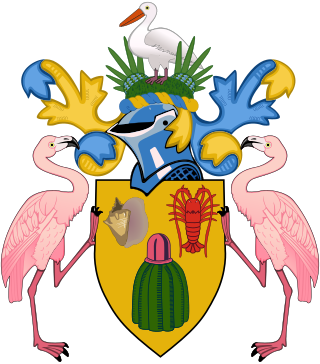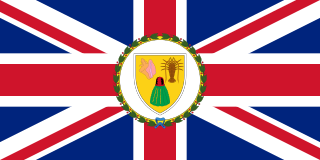
The Turks and Caicos Islands are a British Overseas Territory consisting of the larger Caicos Islands and smaller Turks Islands, two groups of tropical islands in the Lucayan Archipelago of the Atlantic Ocean and northern West Indies. They are known primarily for tourism and as an offshore financial centre. The resident population in 2023 was estimated by The World Factbook at 59,367, making it the third-largest of the British overseas territories by population. However, according to a Department of Statistics estimate in 2022, the population was 47,720.

The British West Indies (BWI) were the territories in the West Indies under British rule, including Anguilla, the Cayman Islands, the Turks and Caicos Islands, Montserrat, the British Virgin Islands, Bermuda, Antigua and Barbuda, the Bahamas, Barbados, Dominica, Grenada, Jamaica, Saint Kitts and Nevis, Saint Lucia, Saint Vincent and the Grenadines, British Honduras, British Guiana and Trinidad and Tobago.

Before European colonization, the Turks and Caicos Islands were inhabited by Taíno and Lucayan peoples. The first recorded European sighting of the islands now known as the Turks and Caicos occurred in 1512. In the subsequent centuries, the islands were claimed by several European powers with the British Empire eventually gaining control. For many years the islands were governed indirectly through Bermuda, the Bahamas, and Jamaica. When the Bahamas gained independence in 1973, the islands received their own governor, and have remained a separate autonomous British Overseas Territory since. In August 2009, the United Kingdom suspended the Turks and Caicos Islands' self-government following allegations of ministerial corruption. Home rule was restored in the islands after the November 2012 elections.

Julian Edward George Asquith, 2nd Earl of Oxford and Asquith, was a British colonial administrator and hereditary peer.

Politics of the Turks and Caicos Islands takes place in a framework of a parliamentary representative democratic dependency, whereby as of August 9, 2006 the Premier is the head of government, and of a multi-party system. The islands are an internally self-governing overseas territory of the United Kingdom. The United Nations Committee on Decolonization includes the Turks and Caicos Islands on the United Nations list of non-self-governing territories. Executive power is exercised by the government. Legislative power is vested in both the government and the Legislative Council.

Providenciales is an island in the northwest Caicos Islands, part of the Turks and Caicos Islands, a British Overseas Territory. The island has an area of 98 km2 (38 sq mi) and a 2012 Census population of 23,769. Providenciales is the third largest island in the Turks and Caicos in area, and is home to a large majority of the population of the Turks and Caicos Islands.
Area code 649 is the local telephone area code of the Turks and Caicos Islands. Area 649 was created in a split from the original area code 809. It became effective 1 June 1997 and mandatory on 31 May 1998.

The governor of the Turks and Caicos Islands is the representative of the British monarch in the United Kingdom's British Overseas Territory of Turks and Caicos Islands. The Governor is appointed by the monarch on the advice of the British government. The role of the governor is to act as the vice-regal representative of the head of state, His Majesty King Charles III. The Governor appoints the Premier and 5 members of the House of Assembly. The official residence of the governor is the Government House of Turks and Caicos Islands, located in Waterloo on the island of Grand Turk.

The coat of arms of the Turks and Caicos Islands consists of a gold-coloured escutcheon (shield) charged with a conch shell, lobster and a cactus, supported by two flamingos, and topped with a pelican in the crest. Adopted three years after the islands became a Crown colony, it has been the coat of arms of the Turks and Caicos Islands since 1965. The escutcheon is featured on the flag of the territory. The previous badge featured two mounds of salt in front of a ship, with doors added to the mounds after they were reportedly mistaken for igloos.

Mohammed Attiqur Rahman, MC, also known by his nickname as General Turk, was a senior general in the Pakistan Army, a noted military historian, and a senior government official. He was the martial law administrator (MLA) of West Pakistan in General Yahya Khan's military regime. He was educated at St.Paul's school, London and joined IMA in 1939 with a sword of Honour and then joined 4th/12th FFR. He was the last Governor of West Pakistan and implemented the dissolution of the One Unit scheme, after which he became the first Governor of Punjab province.

The Turks and Caicos Islands Football Association is the governing body of football in the Turks and Caicos Islands. They control the Turks and Caicos Islands national football team, the MFL League men's league, the Turks and Caicos FA Cup and the WFL League women's league.

Arthur Christopher Watson was a British colonial administrator and politician who served as Governor of Montserrat, Governor of the Turks and Caicos Islands and the British High Commissioner to Brunei.
Alexander Graham Mitchell CBE was the first Governor of the Turks and Caicos from April 1973 to May 1975. He had previously served as the last Administrator of the islands from 1971 to 1973. He went on to serve as Bursar of Dame Allan's Schools. He was appointed CBE in the 1973 Birthday Honours.
Robert Everard Wainwright CMG was the Administrator of the Turks and Caicos in 1965 and from 1967 to 1971. Wainwright was preceded by John Anthony Golding in 1965 and succeeded by Alexander Graham Mitchell in 1971.
John Anthony Golding was a British colonial administrator who served as Administrator of the Turks and Caicos Islands from 1965 to 1967. He was awarded a Commander of the Royal Victorian Order (CVO) personally by Queen Elizabeth II on her visit to the islands in February 1966. He was educated at Bedford School. He died in April 2012 at the age of 91.
Geoffrey Colin Guy CMG, CVO, OBE was the last Commissioner and the first Administrator of the Turks and Caicos from 1958 to 1959 and 1959 to 1965 respectively. Mr. Guy was succeeded by John Anthony Golding in 1965. He was administrator during Hurricane Donna, which in 1960 devastated agriculture on the island. He was managing director of the salt industry on the islands and used profits from the commodity to build airstrips and lay the foundation for today's main industry – tourism.

The current flag of the Turks and Caicos Islands was adopted on 7 November 1968, and modified in 1999. Prior to this, the islands had several different flags either proposed or utilised.
Robert Wainwright may refer to:

The Constitution of the Turks and Caicos Islands, in its present form, was passed in 2011.
Sonia Bien-Aime Fulford is a Turks and Caicos football administrator, the president of the Turks and Caicos Islands Football Association (TCIFA), a member of the FIFA Council, and the Executive Committee of CONCACAF.









